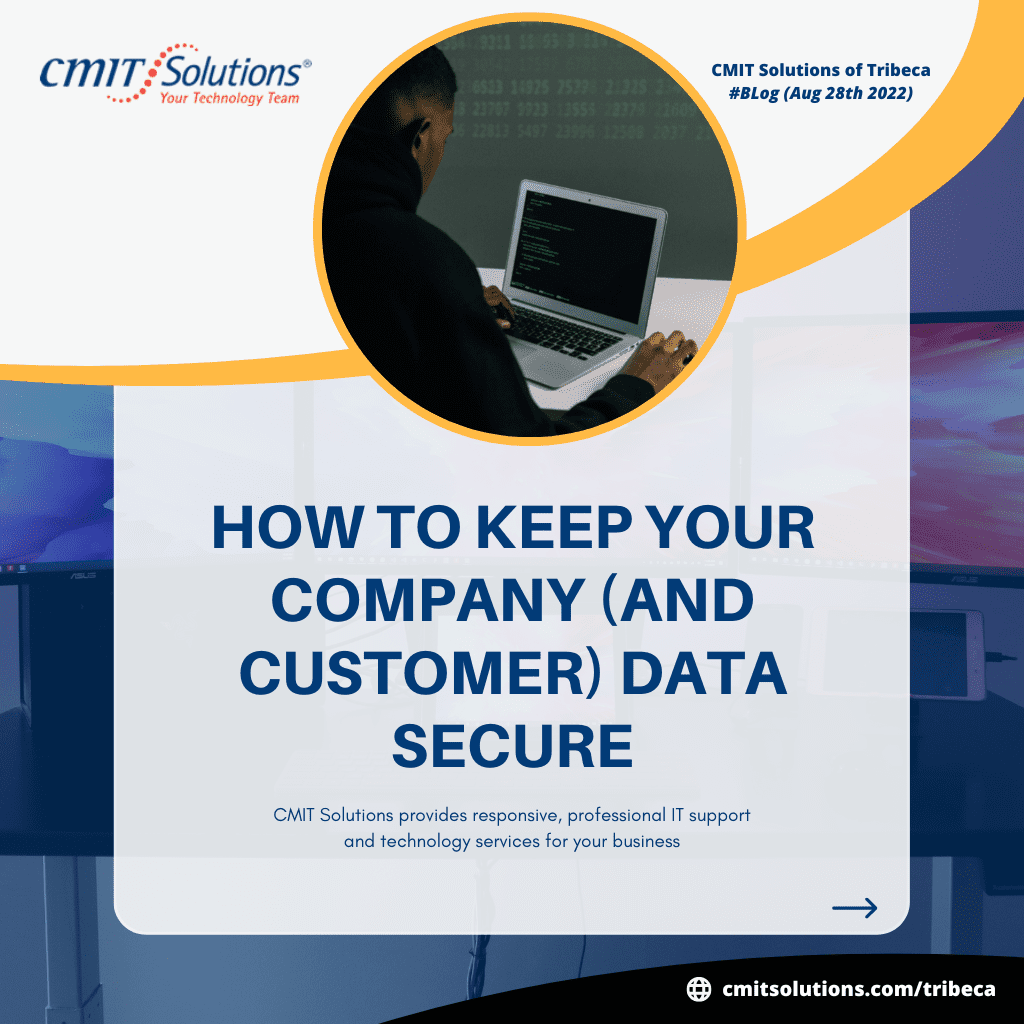In the age of digital information, data security is more important than ever. Companies must take measures to ensure that their customer data is protected from cyber attacks and be transparent about their data security practices. This article will discuss tips on keeping your customer data secure.
Are You Prepared for Data Breach?
Data breaches have become too familiar in recent years, and no company is immune to the threat. If your company stores any customer data, it’s essential to have a plan in place in case of a breach. Here are a some of the things to remember to help keep your customer data secure:
1. Keep your software updated. Old school software is one of the most common ways hackers gain systems access. Ensuring that all software is up to date can help close any security gaps that might be exploited.
2. Use strong passcodes and enable two-factor authentication. Strong passwords are essential for keeping data safe, and two-factor authentication provides an extra layer of protection.
3. Educate employees on data security. Your employees are commonly the first line of defense against data breaches. By educating them on best practices for data security, you can help prevent accidental violations from happening.
4. Use encryption to protect data in transit. When data is being sent between systems, it’s vulnerable to interception. Encrypting data in transit can help keep it safe, even if it falls into the wrong hands.
5. Have a plan in place for responding to a breach.
What Can You Do to Improve Your Data Secure?
Data security is an essential issue for any company, large or small. But what can you do to improve your data security? Here are a few ideas:
-Educate your employees about data security. Make sure they know what sensitive data is and how to protect it.
-Implement physical security measures. This could include restricting access to data centers and using security cameras.
-Use encryption to protect data in transit and at rest.
-Implement strong access control measures. This could include requiring employees to use strong passwords and limiting access to sensitive data.
-Monitor your network for suspicious activity. This could involve things like unusual login attempts or unexpected data transfers.
-Regularly test your security measures. This could include a third party conducting penetration testing or performing regular audits internally.
-
Redundant Cloud-Based Backup Strategies
There are many healthy being of using cloud-based backup services for businesses. They are mainly more reliable and secure than on-premise solutions, and they offer greater flexibility in terms of storage and scalability.
However, not all cloud-based backup services are created equal. Selecting a redundant backup solution is essential to ensure that your company’s data is adequately protected.
A redundant backup solution stores your data in multiple locations, both on-site and off-site. This ensures that your data will still be safe and accessible if one site is compromised.
There are a few different ways to achieve redundancy with cloud-based backup services. One option is to use two other providers, storing your data in both their data centers. Another option is to use a single provider that offers geo-redundant storage, which keeps your data in multiple locations within a single region.
The most efficient way to secure your company’s data is to use a combination of these redundancy strategies. Using multiple providers and geo-redundant storage ensures that your data is always safe and accessible, no matter what happens.
-
Password Strength & Two-Factor Authentication
Using strong passcodes is one of the most important things you can do to keep your company (and customer) data secure. A strong password is complicated for someone to guess.
It should be eight characteristics long and include a mix of uppercase and lowercase letters, numbers, and symbols.
You should never use the same passcode at more than one site. If someone manages to guess your password, they will have access to all of your accounts.
Instead, use a different password for each location. You can use a password manager to help you keep track of all your passwords.
Avoid using easily guessed words like “password” or your name when creating a new password. Also, don’t use easily accessible personal information like your birthdate or address. And never reuse an old password.
If you follow these points, you can help keep your company (and customer) data secure.
-
Employee Cyber Literacy
Most people are known the importance of keeping their data secure. However, not everyone is as vigilant regarding keeping their company’s data safe.
All employees can take a few simple steps to help keep their company’s data safe. Firstly, they should never share their login details with anyone. Secondly, they should always use a strong password and never reuse passwords across different accounts.
Thirdly, employees should be careful about what information they share on social media. They should never post anything that could compromise the security of their company’s data. Finally, they should report any suspicious activity to their IT department.
By following these simple steps, employees can help to keep their company’s data safe from cyber-attacks.
-
Cybersecurity Assessments
As a business owner, keeping your company’s data secure is essential. One method to do this is by conducting cybersecurity assessments. Cybersecurity assessments can help you identify vulnerabilities in your system and take steps to fix them.
There are a few different types of cybersecurity assessments. One is a penetration test, which simulates an attack on your system to see if it can be breached. Another is a risk assessment, which identifies potential risks to your system and helps you plan for them.
Regular cybersecurity assessments can help keep your system secure and protect your customers’ data.
What to Do After a Data Breach
It’s no classified information that data breaches are becoming more and more common. It looks like a week goes by without another significant company making headlines for being the victim of a cyberattack.
While it’s essential to do everything you can to prevent a data breach from happening in the first place, it’s also important to know what to do if one does occur. Here are some moves you need to follow if your company suffers a data breach:
1. Notify affected customers as soon as possible.
2. Research the cause of the breach and take steps to prevent it from happening again.
3. Work with law enforcement if necessary.
4. Provide credit monitoring or other services to affected customers if appropriate.
5. Take steps to improve your overall security posture to help prevent future breaches.
Secure Your Operations
Data security should be a significant priority for any business. Not only is it essential to protect your company’s data, but you also need to protect your customers’ data. You can take multiple steps to secure your online and offline data.
First, make sure that your website is secure. Use SSL encryption to protect any information transmitted between your website and your customers. Also, consider using a security service such as Symantec or McAfee to secure your website.
Second, ensure that your employees are aware of data security procedures. They should know how to handle sensitive information and keep it safe. Ensure they understand the importance of data security and that they will be held accountable if they fail to follow proper procedures.
Third, plan what to do in the event of a data breach. Make sure that you have a way to quickly and securely back up all of your data. You should also have a process for notifying your customers if their personal information has been compromised.
Data security is an essential issue for any business. Taking the proper steps can help protect your company’s and customers’ data.
Fix Vulnerabilities
It’s not confidential that data protection is a hot topic these days. With high-profile data breaches headlines almost daily, companies of all sizes scramble to shore up their security defenses. But what exactly should you have to keep your company’s data safe?
You can take several steps to help secure your data, but one of the most important is fixing vulnerabilities. A vulnerability is like a flaw in your system that attackers could exploit to gain access to your data. By identifying and fixing vulnerabilities, you can help prevent attacks before they happen.
There are various ways to find vulnerabilities in your system. One is to use a vulnerability scanner, a piece of software that scans your system for known vulnerabilities and gives you a report of what it finds. Another option is to hire a penetration tester who will attempt to break into your system using techniques that attackers would use.
Once you’ve found vulnerabilities in your system, fixing them as soon as possible is essential. The most acceptable method to do this is to patch the vulnerable software, which means installing the latest updates from the vendor. This can sometimes be difficult if you’re using an older one.
Notify Appropriate Parties
When a data breach occurs, it’s essential to notify the appropriate parties as soon as possible. This includes your company’s senior management, legal team, and relevant external parties, such as law enforcement or regulators. Notifying these parties quickly will help you to contain the damage and minimize the potential fallout from the breach.
Notify Affected Businesses
You are responsible for keeping your customer data security as a business owner. But what happens when a data breach occurs? In addition to preventing future breaches, you also need to take action to protect your customers.
One of the first and foremost steps you should take is to notify businesses that may have been affected by the data breach. This includes any businesses that have shared or stored data with your company. By informing them of the breach, you allow them to take steps to protect their data.
Sometimes, you may also be required to notify government agencies or regulators about the data breach. This is typically done by filing a report. Depending on the severity of the violation, you may also need to provide information about the incident to the media.
These measures after a data breach can help limit the damage and protect your customers. Being proactive and transparent can show you’re committed to keeping your customer data safe.
Notify Individuals
One way to keep your company and customer data secure is to notify individuals when their data has been breached. This can happen with the help of various means, such as email, text messages, or phone calls. By reporting individuals, you can help to mitigate the damages caused by a data breach and protect your company’s reputation.








